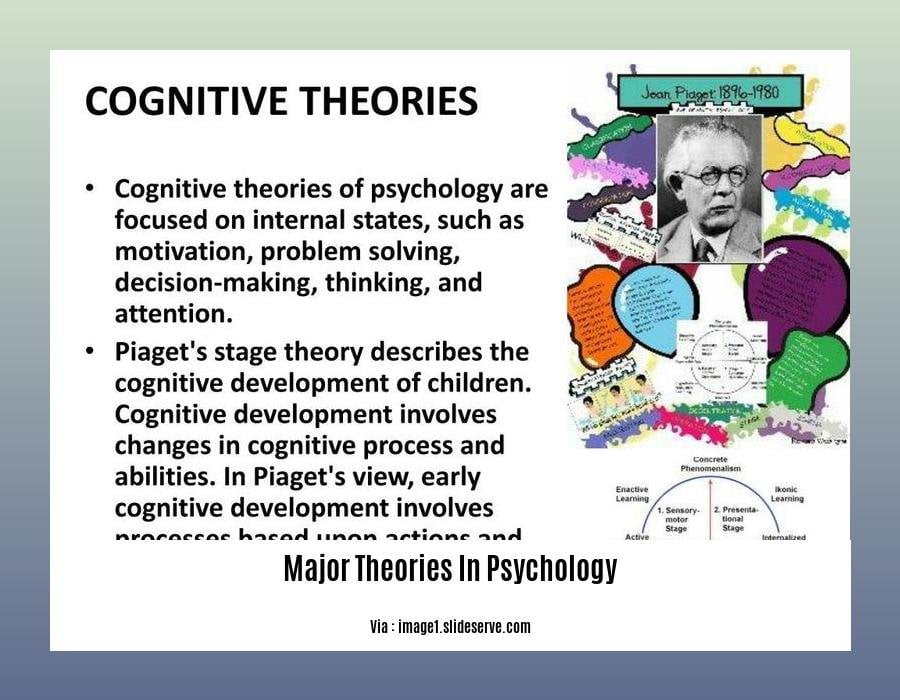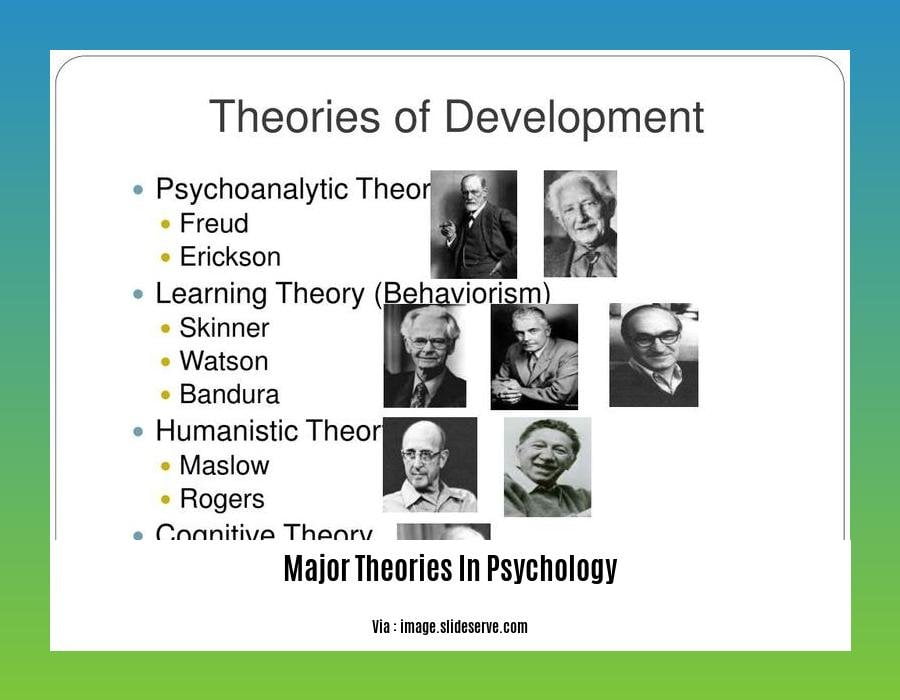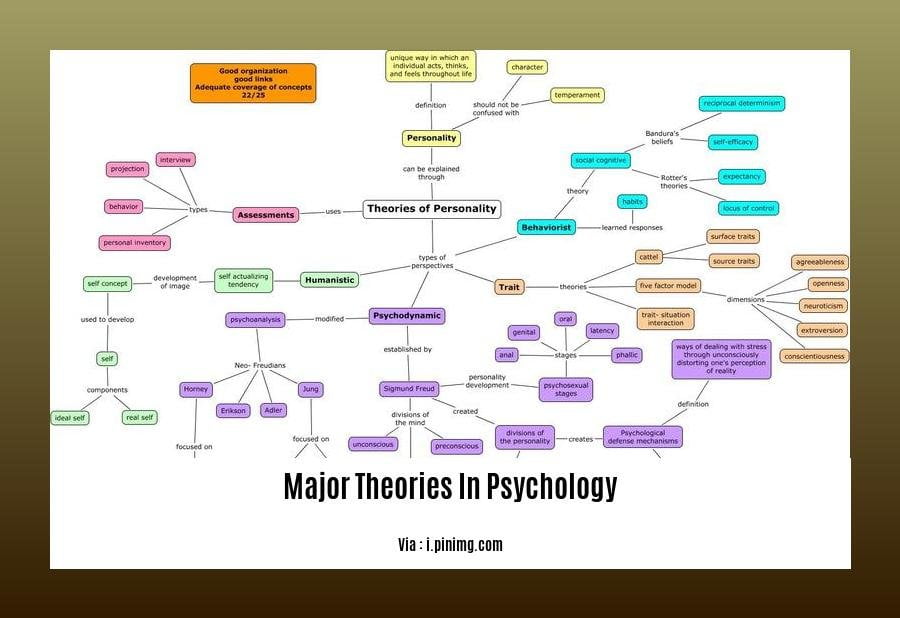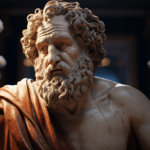Explore the major theories in psychology that have shaped our understanding of human behavior in “Major Theories in Psychology: Shaping Our Understanding of Human Behavior.” From psychoanalysis to behaviorism and cognitive psychology, this article delves into the key concepts and contributions of each theory, providing insights into the complexities of the human mind and the factors that influence our actions, thoughts, and emotions.
Key Takeaways:
- Biological Theories: Behavior stems from genetic, physical, and neurological influences.
- Behaviorist Theories: Behavior is shaped by external stimuli and consequences (conditioning).
- Cognitive Theories: Mental processes like memory, perception, and reasoning drive behavior.
- Psychodynamic Theories: Unconscious conflicts, motives, and childhood shape personality and behavior.
- Humanistic Theories: Human potential, self-actualization, and free will are central to understanding behavior.
Major Theories in Psychology: Shaping Our Understanding of Human Behavior

Diving into the fascinating world of psychology, we encounter a diverse array of major theories in psychology. These theories serve as lenses through which we examine the complexities of human behavior, providing insights into our thoughts, emotions, and actions.
Biological Theories:
Our genes, neurological makeup, and physiological processes play a significant role in shaping our behavior. Biological theories suggest that our inherited traits and brain chemistry influence our personality, temperament, and susceptibility to mental disorders.
Behaviorist Theories:
Learning is central to understanding behavior, according to behaviorist theories. They focus on the observable actions and responses that result from environmental stimuli and reinforcement. Behaviorists aim to modify behavior through conditioning techniques.
Cognitive Theories:
Cognition, the mental processes of perception, memory, and problem-solving, is the cornerstone of cognitive theories. They propose that our thoughts, beliefs, and internal representations shape our behavior. Cognitive psychologists seek to unravel the intricate workings of our minds.
Psychodynamic Theories:
Exploring the depths of the subconscious, psychodynamic theories posit that repressed conflicts, childhood experiences, and unconscious motives drive our behavior. Psychoanalysts delve into the hidden realms of the mind to uncover the root causes of psychological distress.
Humanistic Theories:
Championing human potential, humanistic theories emphasize free will, self-actualization, and the innate goodness of individuals. They focus on the subjective experiences and personal growth that contribute to a fulfilling life.
These major theories in psychology provide invaluable frameworks for comprehending the multifaceted nature of human behavior. By integrating these perspectives, we deepen our understanding of ourselves and others, paving the way for effective interventions and fostering psychological well-being.
Are you fascinated by the evolution of the mind and behavior? Dive into the history of psychology to explore the captivating journey of this field.
Discover the diverse schools of thought in psychology that have shaped our understanding of the human psyche.
Meet the famous psychologists whose groundbreaking theories and discoveries have revolutionized our comprehension of ourselves and the world around us.
Cognitive Psychology

We’ve explored the major theories that delve into human behavior, now let’s dive deeper into the fascinating realm of Cognitive psychology, which takes center stage in understanding our mental processes.
What is Cognitive Psychology?
Picture the human mind as a bustling city, teeming with thoughts, memories, and decision-making processes. Cognitive psychology is the study of this bustling metropolis – how we perceive, remember, think, and solve problems. It’s like peering into the inner workings of the mind’s machinery, unraveling the how and why behind our cognitive adventures.
Key Takeaways:
- Cognitive psychology focuses on the mental processes underlying behavior, from perception to decision-making.
- It explores developmental aspects, like how our cognitive abilities evolve from infancy to adulthood.
- Schema theory explains how we organize and interpret information through mental frameworks.
- Cognitive dissonance theory sheds light on the discomfort we experience when our beliefs clash.
Most Relevant URL Source:
Humanistic psychology: A person-centered approach
Imagine yourself not as a collection of behaviors or unconscious drives, but as a whole, unique individual with the inherent capacity for growth and self-actualization. This is the cornerstone of Humanistic psychology, a perspective that emphasizes the subjective experiences and personal agency of individuals.
Humanistic psychology emerged as a reaction to the prevailing behaviorist and psychoanalytic theories of the time. It rejected the notion that humans are mere products of their environment or unconscious conflicts and instead focused on the inherent dignity, potential, and self-directed nature of individuals.
Key Takeaways:
- Holistic Approach: Emphasizes the interconnectedness of all aspects of the person, including thoughts, emotions, and behaviors.
- Subjective Experience: Values the unique experiences and perspectives of each individual.
- Free Will and Choice: Human beings have the capacity to make choices and direct their own lives.
- Personal Growth: Individuals have an inherent drive towards self-actualization and fulfilling their potential.
- Empathy and Understanding: Therapy focuses on creating a supportive and empathetic environment where individuals can explore their inner world and personal growth.
Most Relevant URL Source:
Psychoanalytic Theory
From the depths of Sigmund Freud’s groundbreaking work, psychoanalytic theory emerged, inviting us on a captivating journey into the hidden realms of the unconscious mind. This theory postulates that our behavior is largely influenced by unconscious conflicts and early childhood experiences that shape our personality.
Key Takeaways:
- Unconscious mental processes play a crucial role in shaping our thoughts and actions.
- Personality develops through distinct stages, each characterized by specific conflicts and resolutions.
- Defense mechanisms are employed to protect the conscious mind from anxiety-provoking thoughts and feelings.
Psychoanalytic theory has influenced therapeutic practices, providing a framework for understanding and treating mental disorders. It emphasizes the exploration of the unconscious through techniques such as free association and dream analysis.
Relevant URL Source:
FAQ
Q1: What are the key differences between the different psychological theories?
A1: The different psychological theories emphasize different aspects of human behavior and use different methods to study it. Biological theories focus on the role of genes, physiology, and neurology in behavior, while behaviorist theories focus on the role of learning and external stimuli. Cognitive theories examine how mental processes like memory, perception, and reasoning shape behavior, while psychodynamic theories explore the influence of unconscious conflicts, motives, and childhood experiences. Humanistic theories emphasize the role of free will, self-actualization, and positive human potential.
Q2: How do cognitive theories explain the development of human intelligence?
A2: Cognitive theories suggest that human intelligence develops through a series of stages, as children progress through developmental milestones and acquire new mental frameworks (schemas). According to Piaget’s developmental approach, children’s cognitive abilities change as they move through specific stages of cognitive growth, characterized by their mental framework.
Q3: What is the main focus of humanistic psychology?
A3: Humanistic psychology focuses on the unique experiences and subjective realities of individuals. It emphasizes the role of free will, self-actualization, and positive human potential. Humanistic psychologists believe that humans have the capacity for growth and personal development and that they should be provided with an environment that supports their well-being.
Q4: How does psychoanalysis explain the development of personality?
A4: Psychoanalysis emphasizes the role of unconscious mental processes in shaping personality. It suggests that personality develops through a series of stages (Oral, Anal, Phallic, Latency, Genital) and that the experiences and conflicts during these stages can have a lasting impact on an individual’s thoughts, feelings, and behaviors.
Q5: What are the key concepts of behaviorist theories?
A5: Behaviorist theories focus on the role of learning and external stimuli in shaping behavior. They emphasize the importance of conditioning, which is the process of learning through the association of stimuli with responses. Behaviorists believe that behavior is primarily a result of environmental factors and that it can be modified through reinforcement and punishment.
- Star Ring Trends: Etsy vs Amazon - March 28, 2025
- Boost Pollinator Habitats: Baby Blue Eyes Sustainable Farming Guide - March 28, 2025
- Protect Big Black Bears: Effective Conservation Strategies - March 28, 2025
















